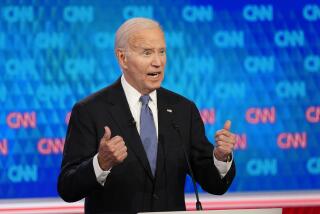Hollywood in the Year AD 1 (After Dole)
Television director Steve Robman, who describes himself as a onetime âBerkeley lefty,â came face to face recently with Hollywoodâs political realities.
While directing an episode of the acclaimed Fox television show âParty of Five,â Robman found himself in an extensive discussion with network and corporate brass over a plot line that called for the 16-year-old female lead to terminate her pregnancy.
âI preferred that sheâd have the abortion and deal with the emotional fallout,â Robman said. âThe producers and network questioned whether the public could accept that decision. They decided probably not, and in the end, she had a miscarriage. The decision might have been different in a different time and place. . . . Even the writers--die-hard liberals--had to admit there was a certain amount of electricity surrounding the issue. There is no question that at the network and corporate level, sensitivities are heightened now.â
Discussions such as these have grown increasingly common since Bob Dole took the film and television industry to task in May 1995 for turning out ânightmares of depravity.â With the likely Republican presidential candidate returning to Hollywood Tuesday for his âsequelâ--a more conciliatory yet still critical address--industry insiders weighed the impact of Doleâs earlier attack.
The broadcast television industry has changed the most, they say, but most attribute it less to Dole than to pressures from both sides of the political spectrum. For his part, President Clinton has also leaned on the industry by supporting the controversial V-chip legislation and by pushing for increased childrenâs educational programming on the major networks.
âA lot of people are getting in on this act,â said Jack Valenti, president of the Motion Picture Assn. of America. âCriticizing our business is high-reward, low-risk. Politicians have found that it moves their numbers and there has been increased sensitivity on our part, as a result.â
Studios and filmmakers, who arenât subject to Federal Communications Commission regulation or internal standards and practices oversight, have largely ignored Doleâs criticism. Studio executives say their consciences and the box office are their guides.
âThe industry has always listened to what the public tells them, in the form of whether they go to the movies or not,â said Tom Sherak, senior executive vice president of 20th Century Fox. âThis summer, whether intentional or not, there seem to be a number of pictures devoid of the sex and violence for which weâre criticized. There was only one four-letter word in âIndependence Day.â âTwisterâ and âMission: Impossibleâ were movies for everyone. Even in âEraserâ the violence was comic book, bigger than life, rather than the graphic kind that turns people off.â
Producer Mark Johnson (âA Little Princess,â âBugsy,â âRain Manâ) said that pocketbook, not politics, dictates what kind of films get made.
â[Recent] movies like âA Little Princessâ or âIndian in the Cupboard,â âAndreâ and âBlack Beautyâ didnât do as well as they should have,â Johnson said. âSo youâll see certain studios didnât have any family films this summer. Thatâs a direct result of those others not doing well, not political pressure at the box office.â
Studio heads worry about the poor receipts for some uplifting fare.
âThe frustrating thing for a lot of us is that there were a lot of family films out last year and audiences didnât go to them,â said Mike Marcus, president of MGM Pictures. âIf audiences donât want to see it, why make it? But, violent, anti-family films fall on their face too. . . . âShowgirlsâ and âStripteaseâ didnât find an audience, but the country isnât turning one direction or another. Certain things strike peopleâs fancy and others donât. People donât sit around thinking, âLetâs go to a family-values movieâ or a really violent one. Nothing has changed since Dole lashed out.â
Some studio executives said their desire to make movies with positive values are dictated from within.
âWe all have moral standards we want to live up to,â said Hal Lieberman, president of production at Universal Pictures. âThatâs our guide. Theyâre not dictated by Dole. . . . But we should excite and titillate and touch peopleâs fantasies. Thatâs what movies are. Those arenas arenât taboo. . . . Movies are elective. No one makes you go.â
âHollywood is synonymous with Sodom and Gomorrah, but [among] the biggest movies last year were âApollo,â âBabe,â âBatman Forever,â â said director Joel Schumacher (âA Time to Kill,â âBatman Forever,â âThe Clientâ). âThose were all suitable for families. But family films have to be as good as the others.â
Veteran movie producer Robert Evans--a lifelong Republican-- said his most recent film, âThe Phantom,â was intended for families, but few went to see it.
He accused Dole of peddling âcheap politics and show business sound bites.â
âNo one [in Hollywood] has paid attention to him,â Evans said. âThey look for the bottom line.â
No matter which side of the political fence they are on, Hollywood observers said that blaming movies and television for the violence in society is off-base.
âHollywood is an easy target, but the wrong one,â said David Horowitz, president of the Center for the Study of Popular Culture, a Los Angeles-based conservative think tank. âIt reflects more than it leads. Hollywood is part of the American community and doesnât impose its values on the country.â
* DOLEâS NEW TAKE
Bob Dole offers Hollywood a new critique to barely polite applause. Section A.
More to Read
The biggest entertainment stories
Get our big stories about Hollywood, film, television, music, arts, culture and more right in your inbox as soon as they publish.
You may occasionally receive promotional content from the Los Angeles Times.










